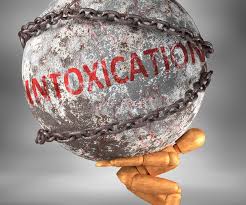
Intoxication is a state of mind in which a person can neither control his actions nor can react in a particular manner. Defense of intoxication is an exception mentioned in section 85 and section 86 under chapter IV of the Indian Penal Code, 1860
Both the mental and physical condition of a person is described in a state of intoxication. Minors, persons of unsound mind, and intoxicated persons do not possess a rational state of mind and cannot understand the nature of their actions.
A person claiming the defense of intoxication to escape liability under section 85 (4) of the Indian Penal Code then he must show both that the intoxication was involuntary and that it either must be able to fulfill the following 3 conditions: –
- The person should be incapable of knowing the nature of the act this means that the intoxication was involuntarily created.
- His mental state at the time should be incapable of acting in thinking responsibly to meet the jurisdictions test for insanity and in all possible isn’t aware that his act is prohibited by the law.
III. Intoxication must have been given forcefully or someone should have induced the person to consume it.
Section 85 mainly contains the general exceptions with deals with offenses committed by the influence of drugs or alcohol or can say it deals with the offenses committed by a person who is intoxicated without his knowledge or against his will or consent or can say which is caused by fraud or coercion. It will render the person incapable of judgment because of intoxication caused against his will.
The main thing to be noted in this section is that this section does not protect someone who voluntarily consumed intoxicants that is self-induced intoxication.
In Bablu alias Mubarik Hussain v. the State of Rajasthan, the court held that evidence of drunkenness that proves that accused is incapable of performing the wrongful intent has also been considered along with other facts and then it should be proved of the accused person has the intention to commit a crime and examined section 85 of the IPC.
To further elucidate, a person who is incapable of knowing the nature of the act and that he was doing something in conflict with the laws of his country under the influence of intoxicating substances cannot be charged with a crime.
Under section 85 of the Indian Penal Code, the important clause to be considered is that the intoxicating substance must be administered against the will of the individual, and under normal circumstances, voluntary drunkenness cannot serve as an excuse for the commission of the crime.
